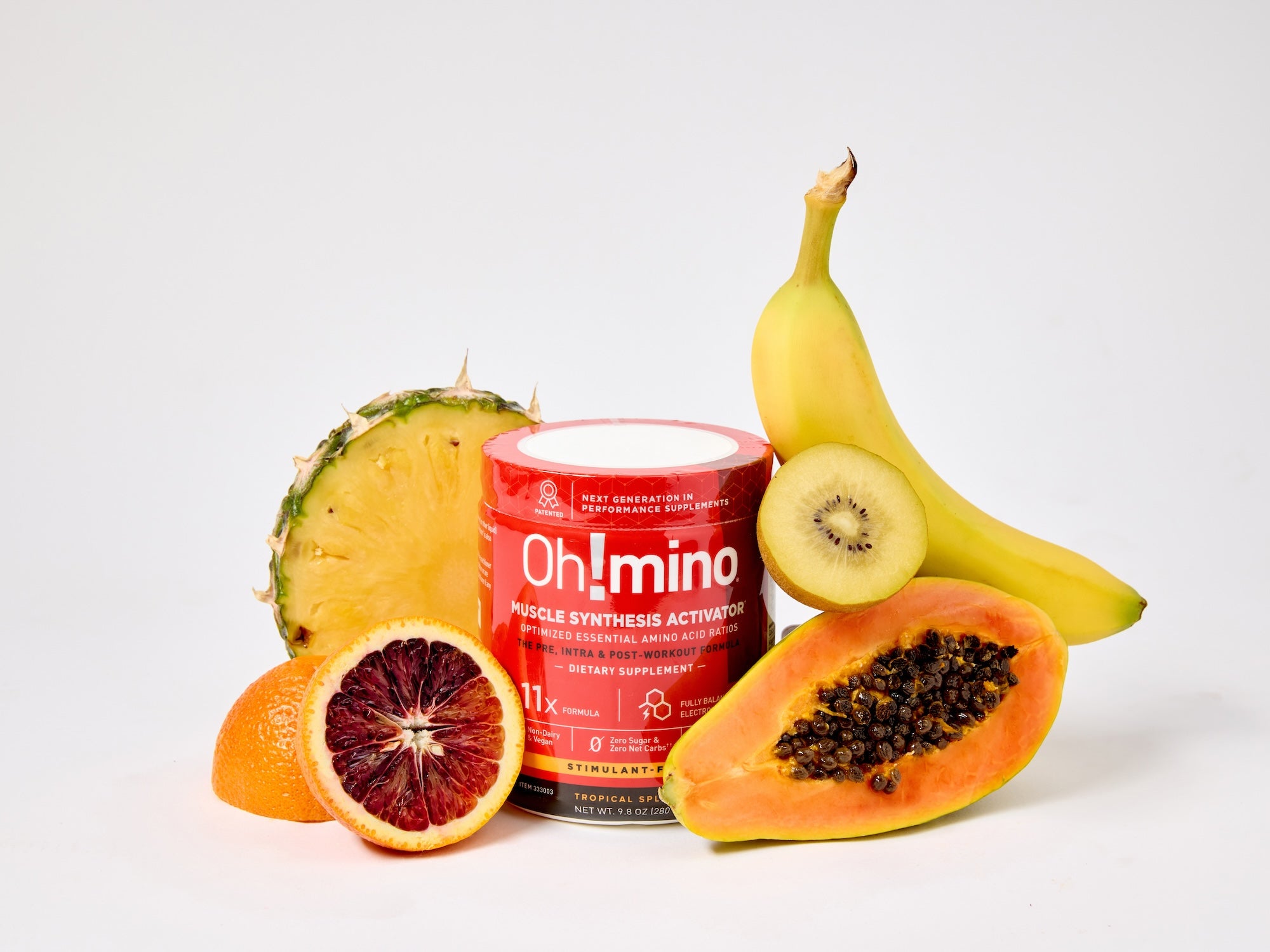Key Takeaways
-
Whey protein supports muscle growth and recovery thanks to its complete amino acid profile and fast absorption, but it’s a tool, not a must.
-
Your protein needs depend on your workout frequency, moderate exercisers need around 20–25 g daily, while intense trainers may benefit from up to 48 g.
-
Whey works best post-workout, pre-workout, between meals, or even at bedtime. What matters most is hitting your daily protein goal consistently.
-
You can build muscle without whey using vegan proteins, whole foods, or complete EAA supplements that support muscle repair and growth.
-
Oh!mino© Muscle Synthesis Activator provides a zero-calorie, vegan-friendly EAA formula clinically proven to outperform whey, supporting recovery, endurance, and performance, all without compromise.
The Truth About Whey Protein for Muscle Growth
Whey protein isn’t magical, but it is backed by science. When combined with resistance training, whey has been shown to support gains in muscle mass and strength while improving how quickly muscles recover after intense workouts. Its real edge lies in its amino acid profile and rapid digestibility.
Whey delivers all nine essential amino acids, including a high dose of leucine, the amino acid most responsible for triggering muscle protein synthesis. It also absorbs faster than most other protein sources, making it ideal for post-workout recovery or any time you need quick nourishment.
What makes whey especially useful is its convenience. It helps you meet daily protein goals when whole foods aren’t available or practical. Still, it’s just a tool, not a requirement. Many athletes have built impressive physiques without ever touching a shake. At the core of muscle growth is consistent training, smart nutrition, and time.
|
Oh!mino©: Elevate Your Performance. Accelerate Your Recovery. Science-Backed Superiority for Every Fitness Journey Power Your Goals with Proven Results:
The Oh!mino Advantage: ✓ Patented formula that’s 11x more effective than protein, 20x more effective than BCAAs Choose Your Perfect Formula: Available in refreshing Tropical Slash or Berry Blast flavors, with stimulant-free or caffeinated options. Prefer capsules? We've got you covered with the same powerful formula. Take before, during, or after training—one solution for your entire workout. |
How Whey Protein Works for Muscle Building
Whey protein is rich in all nine essential amino acids (EAAs), including the branched-chain amino acids leucine, isoleucine, and valine. These particular amino acids are crucial for muscle repair and growth, especially leucine, which directly activates muscle protein synthesis (MPS), the process by which your body builds new muscle tissue after training.
Not just for bodybuilders, whey protein helps casual gym-goers meet their muscle-building goals too.
One of whey’s biggest advantages is how fast it digests. Unlike casein or whole food proteins like meat or legumes, whey protein is rapidly absorbed into the bloodstream. This means it can deliver amino acids to your muscles faster, ideal for the post-workout recovery window when your body is most receptive to nutrients.
This combination of a complete amino acid profile and quick absorption makes whey a highly efficient supplement for supporting muscle growth, especially if your daily protein intake is lacking or inconsistent.
Optimal Whey Protein Dosage Based on Your Activity Level
Your ideal whey protein intake depends on how often you train and how much protein you already get from food. Here’s how to break it down:
For Moderate Activity (≤3 workouts per week)
Stick to 20–25 grams of whey protein per serving. This is usually enough to support basic recovery and muscle repair when combined with balanced meals.
For High Activity (4+ workouts per week)
You may benefit from 24–48 grams per day, ideally split into two servings, such as post-workout and one mid-day or evening dose. This supports more frequent muscle breakdown and recovery.
How to Calculate Your Personal Protein Needs
A good general rule for muscle building is 1.6 to 2.2 grams of protein per kilogram of body weight per day. So if you weigh 70 kg (154 lbs), your target is between 112–154 grams of protein daily.
Whey protein helps fill in the gaps, especially if your diet is inconsistent or you’re aiming for higher muscle growth. Use it to complement your meals, not replace them.
Signs You're Taking Too Much or Too Little
Finding your protein sweet spot is key. Not getting enough can slow your progress, while overdoing it might work against your goals:
-
Too little protein and your body won’t have the raw materials it needs to recover and grow. You may experience persistent muscle soreness, delayed recovery between sessions, chronic fatigue, or a lack of strength and size gains, even if you're training consistently.
-
Too much whey protein, especially when added on top of a complete diet, can lead to side effects like bloating, digestive upset, or unnecessary calorie overload. This is more likely if you’re relying on shakes instead of meals or stacking protein without tracking your intake.
Best Times to Take Whey Protein for Maximum Results
Getting the timing right can help you get the most out of your whey protein.
The Post-Workout Window: Fact vs. Fiction
The idea of a tight “anabolic window” has evolved. Drinking whey within 1–2 hours after your workout still supports muscle recovery and protein synthesis, especially after high-intensity or fasted training.
Pre-Workout Benefits
A whey shake before training supplies your muscles with amino acids, helping improve endurance and reduce muscle breakdown during the workout.
Strategic Timing Throughout the Day
Whey between meals keeps your protein levels steady, helps prevent muscle loss, and curbs cravings, useful for both building muscle and leaning out.
Bedtime Protein: Does It Help?
Casein is ideal at night due to its slow digestion, but whey still works if that’s what you have, especially if your daily protein intake is low or spread too thin.
No matter if you're bulking or cutting, whey protein helps preserve lean mass while supporting your training intensity.
Effective Alternatives If You Can't Take Whey
Whey isn’t the only path to muscle growth. If you’re vegan, lactose-intolerant, or just don’t tolerate dairy well, there are other effective, research-backed ways to meet your protein needs and support recovery.
Vegan Protein Options
High-quality blends made from pea, rice, or hemp can offer complete protein coverage. Look for formulas that include all nine essential amino acids (EAAs), not just BCAAs, to better support muscle protein synthesis.
Whole Food Protein Sources
Foods like chicken, eggs, tofu, tempeh, beans, and Greek yogurt are reliable choices, especially when spaced evenly throughout the day to maximize absorption and muscle repair.
Why Oh!mino© Is a Smarter Choice for Muscle Growth and Recovery
If you're looking to build muscle and recover faster without the added sugar, carbs, or dairy, Oh!mino© Muscle Synthesis Activator delivers a clinically backed alternative to traditional whey protein. It’s a complete performance tool for your training routine.
Lactose-intolerant? A complete EAA supplement like Oh!mino Muscle Synthesis Activator or vegan protein can keep your gains on track.
Why Oh!mino© Works:
-
Patented EAA formula with all 9 essential amino acids (L-Leucine, L-Lysine, L-Threonine, L-Valine, L-Phenylalanine, L-Histidine, L-Isoleucine, L-Tryptophan, and L-Methionine) in the optimal ratio for muscle protein synthesis
-
Proven to be 11x more effective than whey and 20x more effective than BCAAs for muscle building
-
Zero sugar, zero carbs, zero calories, making it ideal for clean bulking, cutting, or intermittent fasting
-
Electrolyte blend supports hydration, endurance, and workout performance
-
Versatile use; take before, during, or after workouts for maximum benefit
-
Available in powder or capsule, and in both stimulant-free or caffeinated options
-
Vegan, dairy-free, gluten-free, and non-GMO for clean, inclusive support
Gain strength, build muscle, recover faster. Power your progress with Oh!mino©!
Frequently Asked Questions (FAQs)
Can I build muscle without any protein supplements?
Yes, it’s possible to build muscle through whole foods alone if you consistently hit your protein targets. Supplements like whey or EAAs just offer added convenience, especially for busy schedules or higher training demands.
Is whey protein safe for long-term use?
For most healthy individuals, whey protein is safe when used within recommended daily amounts. Choose clean-label options without added sugars or fillers, and vary your protein sources to support long-term digestive and nutritional health.
How quickly will I see results from taking whey protein?
With regular training, whey protein may improve muscle recovery and boost strength within 2–4 weeks. Results depend on your workout intensity, overall diet, and if you're consistently meeting your daily protein needs.
Can whey protein cause weight gain or bloating?
Whey can cause weight gain if it adds extra calories beyond your needs. Some people also experience bloating, especially with whey concentrate. Choosing isolate or dairy-free options can reduce digestive discomfort.
Are vegan proteins as effective as whey for muscle building?
Vegan proteins can be effective when they contain all essential amino acids. Look for complete blends or pair complementary sources like rice and peas. Products like Oh!mino© Muscle Synthesis Activator can help fill any gaps.





